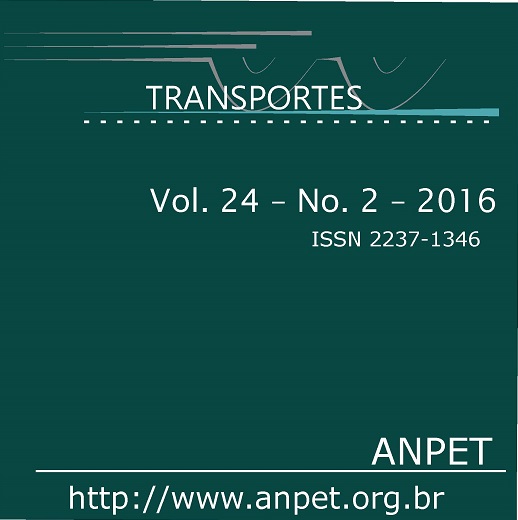Um ambiente multiagent system (MAS) distribuído aplicado à gestão integrada da operação portuária
DOI:
https://doi.org/10.14295/transportes.v24i2.777Resumo
Tendo em vista o aumento do transporte marítimo no mundo e a consequente demanda por operações nos portos, os operadores buscam formas de minimizar o tempo de permanência dos navios no porto. Para atracar um navio, os portos necessitam ter disponíveis diversos recursos. Assim, planejar a designação de recursos eficientemente para não atrasar a atracação dos navios é vital para os portos. Esta designação é dinâmica, pois atrasos e antecipações na chegada dos navios ocorrem por diversos fatores demandando assim que ela seja atualizada constantemente. Este artigo propõe um Multiagent System (MAS) para resolução da designação de recursos de forma distribuída e em tempo real, visando reduzir o tempo de espera para atracação dos navios. Testes foram realizados em 27 cenários e os resultados mostraram que o MAS resolveu instâncias de teste de grande porte e nos cenários mais próximos do real, ele resolveu em um tempo pequeno e com soluções estáveis.
Downloads
Referências
Barros, V. H., Costa, T. S., Oliveira, A. C. M., Lorena, L. A. N. (2011) Model and Heuristic for Berth Allocation in Tidal Bulk Ports with Stock Level Constraints. Computers & Industrial Engineering, v. 60, n. 4, p. 606-613. DOI:10.1016/j.cie.2010.12.018
Bierwirth, C., Meisel, F. (2010) A survey of berth allocation and quay crane scheduling problems in container terminals. European Journal of Operational Research, v. 202, n. 3, p. 615–627.
DOI:10.1016/j.ejor.2009.05.031
Bierwirth, C., Meisel, F. (2009) A fast heuristic for quay crane scheduling with interference constraints. Journal of Scheduling, v. 12, n. 4, p. 345-360. DOI: 10.1007/s10951-009-0105-0
Chen, C. S., Lee, S. M., Shen, Q. S. (1995) An analytical model for the container loading problem. European Journal of Operational Research, v. 80, n. 1, p. 68–76. DOI:10.1016/0377-2217(94)00002-T
Chen, C. Y., Chao, S. L., Hsieh, T. W. (2000) A time-space network model for the space resource allocation problem in container marine transportation. In: Proceedings of 17th international symposium on mathematical programming. Atlanta, USA.
Cheung R. K., Chen C. Y. (1998) A two-stage stochastic network model and solution methods for the dynamic empty container allocation problem. Transportation Science, v. 32, n. 2, p. 142–162. DOI:10.1287/trsc.32.2.142
Cordeau, J. F., Laporte, G., Legato, P., Moccia, L. (2005) Models and tabu search heuristics for the berth-allocation problem. Transportation Science, v. 39, n. 4, p. 526–538. DOI: 10.1287/trsc.1050.0120
Crainic T. G., Gendreau, M., Dejax, P. (1993) Dynamic and stochastic models for the allocation of empty containers. Operations Research, v. 41, n. 1, p. 102–126. DOI:10.1287/opre.41.1.102
Golias, M., Boile, M., Theofanis, S. (2007) The stochastic berth allocation problem. In: Proceedings of the International Conference on Transport Science and Technology (TRANSTEC 2007). Czech Technical University, Prague, pp. 52–66.
Graham, J. R. (2001) Real-Time Scheduling In Distributed Multi Agent Systems. PhD Thesis, University of Delaware.
Haidt, J. (2003) The Moral Emotions. In Davidson, R., Scherer, K., Goldsmith, H., (orgs.) Handbook of Affective Sciences, Oxford University Press. NY, USA.
Han, M., Li, P., Sun, J. (2006) The algorithm for berth scheduling problem by the hybrid optimization strategy GASA. In: Proceedings of the Ninth International Conference on Control, Automation, Robotics and Vision (ICARCV’06). IEEE Computer Society, Washington DC, p. 1–4.
DOI:10.1109/ICARCV.2006.345455
Hansen, P., Oguz, C., Mladenovic, N. (2008) Variable neighborhood search for minimum cost berth allocation. European Journal of Operational Research, v. 191, n. 3, p. 636–649. DOI:10.1016/j.ejor.2006.12.057
Imai, A., Chen, H. C., Nishimura, E., Papadimitriou, S. (2008) The simultaneous berth and quay crane allocation problem. Transportation Research Part E, v. 44, n. 5, p. 900–920. DOI:10.1016/j.tre.2007.03.003
Imai, A., Nishimura, E., Papadimitriou, S. (2001) The dynamic berth allocation problem for a container port. Transportation Research Part B, v. 35, n. 4, p. 401–417. DOI:10.1016/S0191-2615(99)00057-0
Imai, A., Nishimura, E., Papadimitriou, S. (2003) Berth allocation with service priority. Transportation Research Part B, v. 37, n. 5, p. 437–457. DOI:10.1016/S0191-2615(02)00023-1
Kelton, D. (2006) Simulation with Arena (4ª ed.). MaGrawHill, New York, USA.
Kim, K. H., Bae, J. W. (1998) Re-marshaling export containers in port container terminals. Computers & Industrial Engineering, v. 35, n. 3-4, p. 655–658. DOI:10.1016/S0360-8352(98)00182-X
Kim, K. H., Park, K. T. (2003) A note on a dynamic space-allocation method for outbound containers. European Journal of Operation Research, v. 148, n. 1, p. 92–101. DOI:10.1016/S0377-2217(02)00333-8
Kim, K. H., Park, Y. M., Ryu, K. R. (2000) Deriving decision rules to locate export containers in storage yards. European Journal of Operations Research, v. 124, n. 1, p. 89–101. DOI:10.1016/S0377-2217(99)00116-2
Li, B., Yan, X. (2010) Berth allocation problem with Harvard architecture and agent-based computing. In: International Conference on Computer Application and System Modeling (ICCASM 2010). IEEE, Taiyuan, v. 1, p. 197-201. DOI:10.1109/ICCASM.2010.5619336
Lokuge, P., Alahakoon, D. (2007) Improving the adaptability in automated vessel scheduling in container ports using intelligent software agents. European Journal of Operational Research, v. 177, n. 3, p. 1985–2015. DOI:10.1016/j.ejor.2005.12.016
Mauri, G. R., Oliveira, A. C. M., Lorena, L. A. N. (2010) Resolução do Problema de Alocação de Berços Através de Uma Técnica de Geração de Coluna. Pesquisa Operacional, v. 30, n. 3, p. 547– 562. DOI:10.1590/S0101-74382010000300003
Meisel, F., Bierwirth, C. (2006) Integration of berth allocation and crane assignment to improve the resource utilization at a seaport container terminal. In: Haasis, H. D., Kopfer, H., Schonberger, J. (Eds.), Operations Research Proceedings 2005. Springer, Berlin., p. 105–110. DOI:10.1007/3-540-32539-5_17
Monaco, M. F., Sammarra, M. (2007) The berth allocation problem: a strong formulation solved by a Lagrangean approach. Transportation Science, v. 41, n. 2, p. 265–280. DOI:10.1287/trsc.1060.0171
O'Hare, G., Jennings, N. (1996) Foundations of Distributed Artificial Intelligence. John Wiley & Sons Inc., New York, USA.
Oguz, C., Błazewicz, J., Cheng, T. C. E., Machowiak, M. (2004) Berth allocation as a moldable task scheduling problem. In: Proceedings of the Ninth International Workshop on Project Management and Scheduling (PMS 2004). Nancy, p. 201–205.
Rashidi, H., Tsang, E. P. K. (2013) Novel constraints satisfaction models for optimization problems in container terminals. Applied Mathematical Modelling v. 37, n. 1, p. 3601–3634. DOI:10.1016/j.apm.2012.07.042
Rosa, R. (2006) Uma Abordagem Baseada em Negociação de Agentes para a Resolução do Problema de Alocação Dinâmica de Navios em Berços de Terminais Portuários. Tese de Doutorado, Universidade Federal do Espírito Santo, Programa de Pós-Graduação em Engenharia Elétrica.
Stahlbock, R., Voß, S. (2008) Operations research at container terminals: a literature update. OR Spectrum, v. 30, n. 1, p. 1–52. DOI: 10.1007/s00291-007-0100-9
Steenken, D., Voß, S., Stahlbock, R. (2004) Container terminal operation and operations research - a classification and literature review. OR Spectrum, v. 26, n. 1, p. 3–49. DOI:10.1007/s00291-003-0157-z
Sun, B., Sun, J. Q., Chen, Q. S. (2013). Integrated scheduling for berth and quay cranes based on robust and reactive policy. Systems Engineering -Theory & Practice, v. 33, n. 4, p. 1076–1083.
Sun, B., Sun, J., Yang, P. (2009) The Design and Implementation of Berth Allocation Management System Based on MAS. In: Fifth International Conference on Natural Computation (ICNC 2009). IEEE, Tianjian, p. 593–597. DOI:10.1109/ICNC.2009.533
Theofanis, S., Boile, M., Golias, M. (2007a) An optimization based genetic algorithm heuristic for the berth allocation problem. In: IEEE Congress on Evolutionary Computation 2007 (CEC 2007). IEEE Computer Society, Washington DC, p. 4439–4445. DOI:10.1109/CEC.2007.4425052
Theofanis, S., Golias, M., Boile, M. (2007b) Berth and quay crane scheduling: a formulation reflecting service deadlines and productivity agreements. In: Proceedings of the International Conference on Transport Science and Technology (TRANSTEC 2007) Czech Technical University, Prague, p. 124–140.
Umang, N., Bierlaire, M., Vacca, I. (2011) The Berth Allocation Problem in Bulk Ports. In: Proceedings of the 11th Swiss Transport Research Conference (STRC 2011). Monte Verita/Ascona, Switzerland.
Vis, I. F. A., de Koster, R. (2003) Transshipment of containers at a container terminal: an overview. European Journal of Operational Research, v. 147, n. 1, p. 1–16. DOI:10.1016/S0377-2217(02)00293-X
Wooldridge, M. (2000) Intelligent Agents, In: WEIS, G. (Org.), Multiagent Systems, A Modern Approach to Distributed Artificial Intelligence. MIT Press, Cambridge.
Yan, N., Zhou, Y. (2013) Agent-Based Automatic Shore Operating Scheduling for a Container Terminal. TELKOMNIKA Indonesian Journal of Electrical Engineering, v. 11, n. 2, p. 653–658. DOI:10.11591/telkomnika.v11i2.1989
Yan, N., Liu, G., Xi, Z. (2008) A multi-agent system for container terminal management. In: 7th World Congress on Intelligent Control and Automation (WCICA 2008). IEEE, Chongqing, p. 6247–6252. DOI:10.1109/WCICA.2008.4593869
Yin, X. F., Khoo, L. P., Chen, C. H. (2011). A distributed agent system for port planning and scheduling. Advanced Engineering Informatics, v. 25, n. 3, p. 403–412. DOI:10.1016/j.aei.2010.10.004
Yu, M., Wang, S. (2006) Study on Scheduling System Based on Multi-Agent of Container Terminal. 10th International Conference on Computer Supported Cooperative Work in Design, 1–6. DOI:10.1109/CSCWD.2006.253056
Zhao, H., Cheng, L. (2009) Coordinated Scheduling of Berth and Quay Crane Based on MAS. Third International Symposium on Intelligent Information Technology Application Workshops (IITAW '09). IEEE, Nanchang, p. 328–331. DOI:10.1109/IITAW.2009.121
Zhou, P., Kang, H., Lin, L. (2006) A dynamic berth allocation model based on stochastic consideration. In: Proceedings of the Sixth World Congress on Intelligent Control and Automation (WCICA 2006). IEEE Computer Society, Washington DC, v. 2, p. 7297–7301. DOI:10.1109/WCICA.2006.1714503
Downloads
Publicado
Como Citar
Edição
Seção
Licença
Ao submeter um manuscrito para publicação neste periódico, todos os seus autores concordam, antecipada e irrestritamente, com os seguintes termos:
- Os autores mantém os direitos autorais e concedem à Transportes o direito de primeira publicação do manuscrito, sem nenhum ônus financeiro, e abrem mão de qualquer outra remuneração pela sua publicação pela ANPET.
- Ao ser publicado pela Transportes, o manuscrito fica automaticamente licenciado sob a Licença Creative Commons CC BY 4.0. Esta licença permite o seu compartilhamento com reconhecimento da autoria e da publicação inicial neste periódico.
- Os autores têm autorização para assumir contratos adicionais separadamente, para distribuição não exclusiva da versão do trabalho publicada neste periódico (por ex.: publicar em repositório institucional ou como capítulo de livro), com reconhecimento da publicação inicial na Transportes, desde que tal contrato não implique num endosso do conteúdo do manuscrito ou do novo veículo pela ANPET.
- Os autores têm permissão e são estimulados a publicar e distribuir seu manuscrito online (por ex.: em repositórios institucionais ou na sua página pessoal) depois de concluído o processo editorial. Como a Transportes é de acesso livre, os autores são estimulados a usar links para o DOI do artigo nesses casos.
- Os autores garantem ter obtido a devida autorização dos seus empregadores para a transferência dos direitos nos termos deste acordo, caso esses empregadores possuam algum direito autoral sobre o manuscrito. Além disso, os autores assumem toda e qualquer responsabilidade sobre possíveis infrações ao direito autoral desses empregadores, isentando a ANPET e a Transportes de toda e qualquer responsabilidade neste sentido.
- Os autores assumem toda responsabilidade sobre o conteúdo do manuscrito, incluindo as devidas e necessárias autorizações para divulgação de dados coletados e resultados obtidos, isentando a ANPET e a Transportes de toda e qualquer responsabilidade neste sentido.










